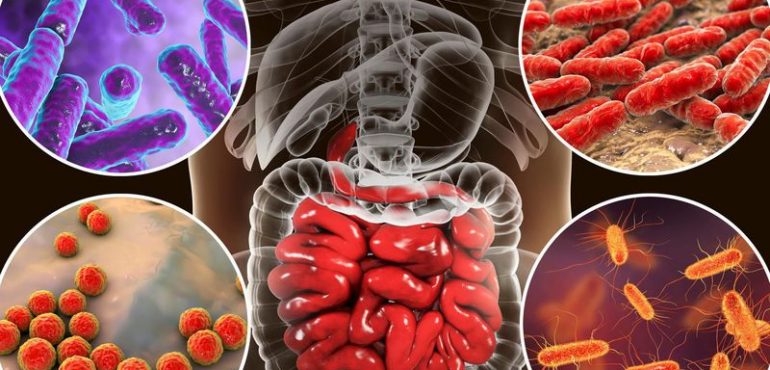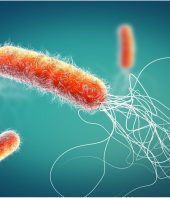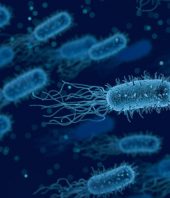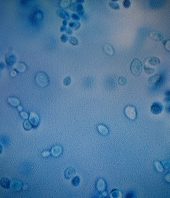The human microbiome—a collection of bacteria, archaea, fungi and viruses commingling in the gut and intestines—has been linked to a wide range of human health conditions, including digestive health and the prevention of autoimmune diseases. Some research has even identified a possible link between gut health and brain function. Building on this work, a study published yesterday in Nature Microbiology reveals that clinical depression could be affected by the amounts of certain bacteria in the gut.
The research team, led by microbiologist Jeroen Raes of the Catholic University of Leuven in Belgium, found that almost all gut bacteria are able to produce neurotransmitters, which are chemicals like dopamine and serotonin that enable communication between neurons. If these “chemical messengers” are sent to receptors in the brain, they can influence mood and behavior. The researchers also identified two strains of bacteria that are lacking in the guts of people who have been diagnosed with depression.
The study adds to mounting evidence that an association between gut health and the brain exists. However, it does not establish whether poor mental health causes depletion of the bacteria, or if the missing bacteria intensifies symptoms associated with mood disorders. More research is needed to conclusively say that gut bacteria influences mental health, says Mark Lyte, a professor of microbiology at Iowa State University who wasn’t involved in the study.
"The studies are just really starting," Lyte says. "We do not fully understand what all the genes in all the bacteria do, so don't make the conclusion that we understand everything about the microbiota in terms of their genetic capacity to make [neurotransmitters]. We only understand a fraction of that." Scientists recently identified more than 100 new species of bacteria in the human gut, underscoring how much we still have to learn about the functions of the microbiome.
Raes and his team studied the gut bacteria of over 2,000 European participants to examine a possible link between the microbiome and mental health. In their study, the team tested the genomes of 532 strains of bacteria to determine if the bacteria could create neurotransmitters. Over 90 percent of the bacteria in the study demonstrated the ability to produce one or more of these chemical messengers.
The body’s longest nerve, the vagus nerve, runs from the brainstem to the lowest part of the intestines. The nerve is thought to be a two-way highway, sending signals from the brain to the gut to regulate digestion and bringing signals from the gut to the brain. The latter function provides a possible pathway for neurotransmitters produced by gut bacteria to influence mental health, Raes says. The team found that both Coprococcus and Dialister bacteria were depleted among individuals with depression, even when controlling for the effects of antidepressants. Coprococcus was also found to have a biological pathway associated with dopamine, a neurotransmitter known to influence mental health.
The next step, Lyte says, is to develop a more complete understanding of how these two strains of bacteria function in the gut. Scientists have studied the genetic traits of some bacteria extensively, like E. Coli, but the genomes and traits of bacteria like Coprococcus and Dialister have yet to be carefully examined. Lyte says that scientists will need to use “old-school” microbiology, growing these bugs in petri dishes to see how they function. A bacterium that behaves one way on paper could function very differently when exposed to a diverse environment of microbes similar to the human gut.
“You have to grow these bugs up and see what they do [in different environments] to understand what they’re going to do when they’re in the host,” Lyte says.
Additionally, Raes says his team has only identified bacteria that could influence mental health at the genus level, and that it’s crucial to identify the specific species of bacteria that are absent in people with depression to test a possible relationship between the gut and the brain. While lower levels of Dialister were associated with depression, a recent paper linked higher levels of Dialister with arthritis. It could be that prevalence of one species of Dialister increases risk of arthritis while prevalence of another reduces risk of depression, Raes says, but determining such specifics will require additional studies.
The ability to produce neurotransmitters also might be unique to bacteria that evolved in the gut, as the capability hasn’t been found in wild bacteria outside the microbiome. “It feels like an evolutionary adaptation to the symbiosis of bacteria and [humans],” Raes says. “If you start thinking about that, then your head explodes. Bacteria live within us and have found all these ways to communicate with us and potentially influence our behavior.”
Emma Allen-Vercoe, a professor of microbiology at the University of Guelph in Ontario, says she is excited about the future potential of microbiome research. While many more studies would be required before scientists could perform a treatment trial, Allen-Vercoe believes that Coprococcus and Dialister could be great candidates to use as psychobiotics, or probiotics that target mental health. Finding a way to grow these microbes so they could be administered to patients would be “far from trivial,” but she hopes scientists can eventually introduce the bacteria into human guts of and examine the results.
“When I read this paper I was super excited, because I really think this is a new frontier in medicine,” Allen-Vercoe says. “Thinking outside the box in terms of using microbes in the gut to treat diseases that traditionally haven’t been associated with the gut is quite exciting, because we’re thinking about things in a whole different way. They’ve really started something here.”
Source: Smithsonian, Full Article






